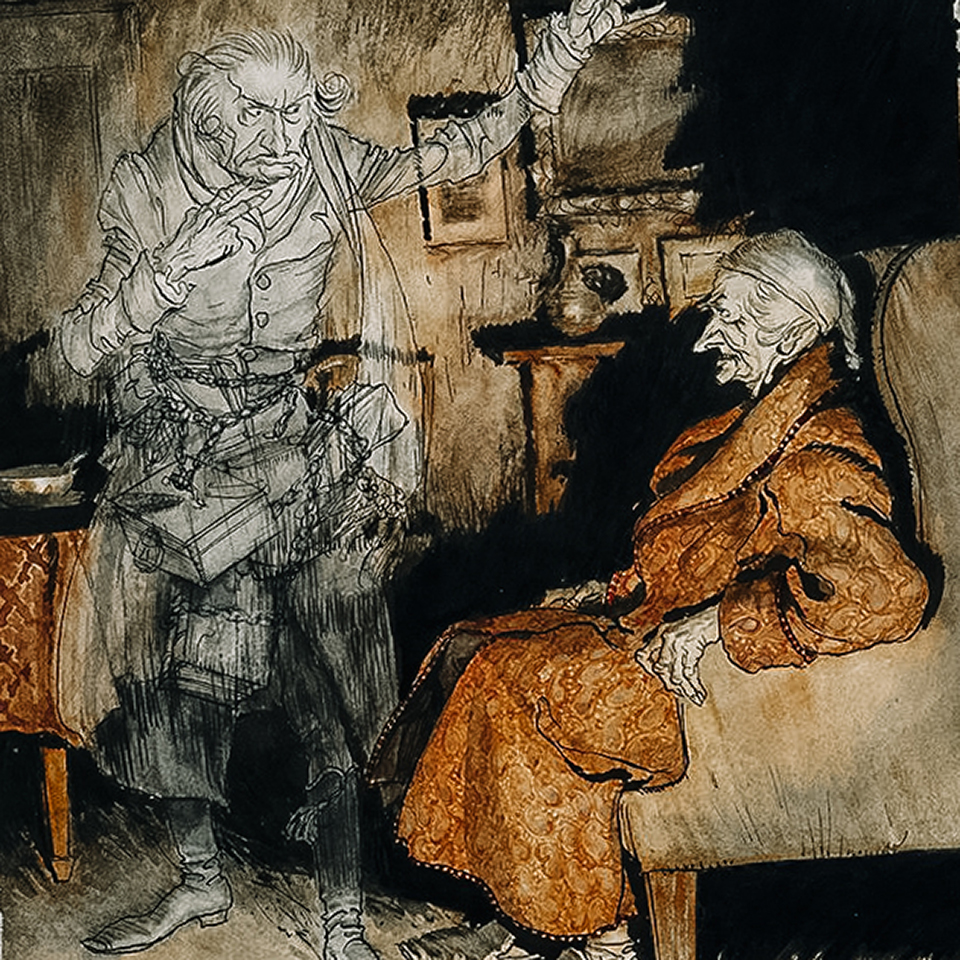An old sinner.
That is how Charles Dickens described Ebenezer Scrooge in the very beginning of his 1843 classic, A Christmas Carol.
But that was not all.
Oh! But he was a tight-fisted hand at the grindstone, Scrooge! a squeezing, wrenching, grasping, scraping, clutching, covetous, old sinner! Hard and sharp as flint, from which no steel had ever struck out generous fire; secret, and self-contained, and solitary as an oyster. The cold within him froze his old features, nipped his pointed nose, shriveled his cheek, stiffened his gait; made his eyes red, his thin lips blue; and spoke out shrewdly in his grating voice.
People feared Scrooge. Even as an older, slightly hunched man, his furrowed brow and unforgiving scowl gave the impression of physical menace. He lacked all measure of intentionality. Londoners who knew him (or simply looked upon him for the first time) would not only avoid asking him for money, but also for directions, the time, or even a cheerful, “How do you do?” Scrooge’s “interior castle” had nothing of St. Teresa’s capaciousness, little of her love and light and warmth. No. His soul’s space was as dark, cramped, and cold as his icy, inhospitable stare. Scrooge, like the ice-encased, self-absorbed Satan of Dante’s Inferno, was the embodiment of homo incurvatus in se (a man being curved in upon himself).
And yet, when Marley’s Ghost, weary and fettered, haunted Scrooge that first night, he blasted the old man in warning. “I wear the chain I forged in life. I made it link by link, and yard by yard; I girded it on my own free will, and of my own free will I wore it. Is its pattern strange to you?” Trembling, Scrooge denied, obfuscated, and rationalized about the nature of business. But the grey and sallow ghost roared in return, “Business!” . . . “Mankind was my business. The common welfare was my business; charity, mercy, forbearance, and benevolence, were, all, my business. The dealings of my trade were but a drop of water in the comprehensive ocean of my business!”
Bereft of hope, Marley’s Ghost mourned, “Why did I walk through crowds of fellow-beings with my eyes turned down, and never raise them to that blessed Star which led the Wise Men to a poor abode! Were there no poor homes to which its light would have conducted me!”
For the rest of his Christmas Eve, his dark night of the soul, Scrooge would be forced out of himself. He would be drawn from his inner darkness, “uncurved” from his self-consumption, and forced to raise his eyes to the “crowds of fellow-being” and to the blessed Star. At the very beginning of A Christmas Carol and in its fearful climax, the drama takes place in a graveyard. Presumably it is the same in the beginning as it is at the end. To be sure, these are scenes of memento mori. But what is often overlooked is that the graveyard is named for St. Paul, the greatest missionary the Church has ever known. Scrooge was likewise being called out of himself to visit strange, uncomfortable places. At the insistence of three ghosts, the deeply unintentional Scrooge would endure the shock of intentionality.
And what did Scrooge find?
In encountering his past with profound intentionality, he saw people again as if for the first time. And even though he was imperceptible to them, Scrooge experienced them in full with a profound attention to their words and expressions, to their touch and bearing. His dear sister Fan and his mirthful boss Mr. Fezziwig, his earnest nephew Fred and his long-suffering employee Bob Cratchit, all came before him with a dazzling luminosity. And in his lost love Belle and the frail Tiny Tim, Scrooge remembered what he had long forgotten: heavenly love and bottomless pity. In his ghost-ushered evening, the old man reckoned with neglected pain and loneliness, glowed with fondness for friendships and loves, brimmed with an empathy for the plight of others, and burned with a hunger to do what is right.
Indeed, Scrooge’s evening was a walk of intentionality for a deeply unintentional man. But it was also an unparalleled examination of conscience. His heart soared and plummeted. He laughed joyously and wept bitterly. At the beginning of the evening, when Scrooge fearfully (and cynically) questioned the intent of the Ghost of Christmas Past, the spectre answered, “Your reclamation.” By the end of the evening, that is exactly what happened. The old sinner, at last, knew that he had sinned. And he craved absolution.
To be sure, Ebenezer Scrooge’s story is an instructive one. After all, I too am an old sinner. Self-absorbed and distracted, I can be incurvatus in se. Too often, I walk through crowds of fellow-beings with my eyes turned down and can even miss the blessed Star. A Christmas Carol reminds us that it is the season for intentionality, for examination of conscience. Yes, it is a season of reclamation.
This Christmas let us be reclaimed.
